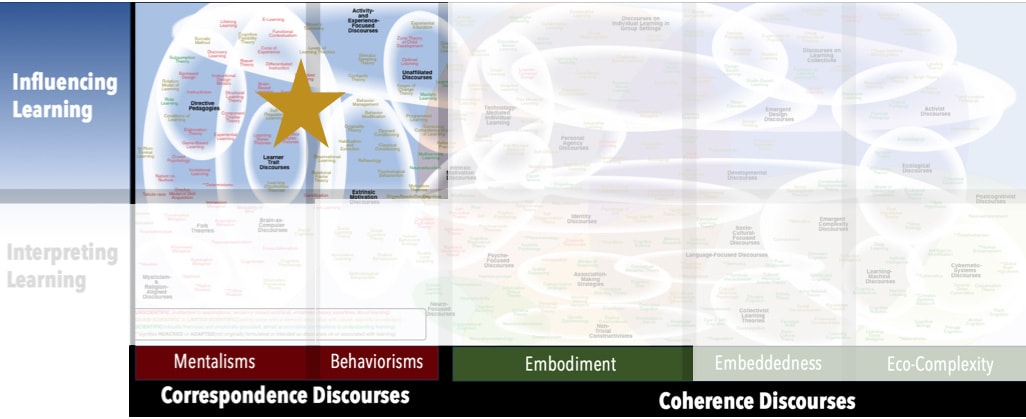AKA
Observational Instruction
Vicarious Learning
Focus
Learning by observingPrincipal Metaphors
Observational Learning is more focused on a category of phenomena (i.e., what can be learned by observing what others are doing), and so tends to draw on a broad range of theories. Consequently, there is typically considerable diversity, and frequently incompatibility, among its invoked metaphors for knowledge, learning, and teaching. Most commonly, clusters of metaphors are aligned with Behaviorisms, with frequent use of notions from the Acquisition Metaphor, the Attainment Metaphor, and other Folk Theories. That said, it is not uncommon to come across vocabulary from theories such as Situated Learning and Distributed Cognition.Originated
1960sSynopsis
As its name suggests, Observational Learning is concerned with learning that occurs through observing – and, most often, observing others. It frequently occurs without any apparent externally administered reinforcement – and so, while it tends to lean heavily on both Classical Conditioning and Operant Conditioning, it also draws on a range of theories that address social and cultural dynamics. Prominent associated notions and discourses include:- Chameleon Effect – nonconscious mimicking of the actions and behaviors of others in one’s immediate social setting
- Emulation Learning (David Wood, 1980s) – the devising of one’s own behavioral strategies, based on the observations of another’s actions and the outcomes of those actions
- Imitation – an agent observing and replicating the actions of another. The notion appears across many discourses on learning (and teaching) in education, but Observational Learning is one of the few places where it’s engaged as a study-able notion. Associated constructs include:
- Delayed Imitation (Albert Bandura, 1970s) – the manifestation of a behavior learned through Imitation at a later time – sometimes days and even weeks later
- Imitative Learning (N.E. Miller & J.C. Dollars, 1940s) – the postulate that an organism will learn from observing another organism’s behavior, if it is rewarded when it performs that behavior
- Insightful Learning – descriptive of moments of Observational Learning associated with an “Aha!” – that is, a moment of conscious connection to other learnings and/or aspects of life
- Latent Learning – a form of learning that can occur through observation – without rehearsal, reinforcement, motivation, or immediate change in behavior. Usually described as “subconscious,” Latent Learning only manifests when the learner is sufficiently motivated, some time after initial exposure.
- Modeling Theory – the suggestion that changes in thinking, acting, or feeling result from observing someone else’s behavior and/or the effects of that behavior. While a broader notion, Modeling Theory is often used synonymously with Observational Learning.
Commentary
Observational Learning is not a theory of learning, but a category of interest. As such, it serves as a sort of collecting place for diverse theories of learning that might yield insight into learning by observation, but it often does so in an indiscriminate and opportunistic manner – sometimes inattentive to the incompatibilities and contradictions.Authors and/or Prominent Influences
For reasons mentioned above, it makes little sense to name seminal thinkers of Observational Learning.Status as a Theory of Learning
Observational Learning is not a theory of learning, although many seem to think it is. In particular, since the early-2000s, it has come to be strongly associated with mirror neurons – that is, specialized neurons that activate in the same way whether engaging in or observing a specific motor action. Observational Learning is seen by some as a Rosetta Stone that might help fuse the wide diversity of discourses that are invoked within the perspective.Status as a Theory of Teaching
With its open attitude to such a diversity of learning discourses, Observational Learning has served as a sort of clearinghouse for teaching advice. However, this advice is not sufficiently focused or coherent to describe the perspective as a theory of teaching.Status as a Scientific Theory
Observational Learning is most often encountered as an assertion or a principle. On its own, it does not constitute a theory. However, it is integral to many well-research discourses, such as Social Learning Theory and Social Cognitive Theory.Subdiscourses:
- Chameleon Effect
- Delayed Imitation
- Emulation Learning
- Imitation
- Imitative Learning
- Insightful Learning
- Latent Learning
- Modeling Theory
Map Location

Please cite this article as:
Davis, B., & Francis, K. (2023). “Observational Learning” in Discourses on Learning in Education. https://learningdiscourses.com.
⇦ Back to Map
⇦ Back to List
